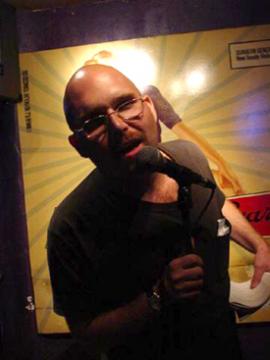2012 Interview with Jon Berger

1) Jon, what do you call this artform that you engage in?
I'm a little uncomfortable calling myself a poet, since I find what I do (reading/ranting little bits of story that I call "pieces") isn't especially poetical. I often describe myself as a Reader, but no one seems to understand when I make reference to the term. I guess that standup poet, performance poet, or short attention span poet are terms I use where people can get the idea.
2) Did you ever read Keats, Byron, and/or Shelley, and if so what did you think of their writing?
I have read virtually no poetry in my life. I've glances at Ginsberg. I've read a bunch of John S. Hall - and a little Bukowski and Mark Leyner. Oh! I really like former poet laureate Billy Collins. He's the closest to an established guy that I've absorbed. Mostly, though, I take inspiration from musicians.
3) What differentiates you from most slam poets that you have seen?
Not all that much - the slam time unit seems to be three minutes, and most of my pieces clock in at a little less than 60 seconds.
I think a lot of slam poetry seeks to be deep or meaningful, but, of course, a lot of slam poets are in college, and don't have especially personal deep or meaningful things to say. I've seen a lot of good people at slams at Bowery Poetry Club and Nuyorican, but I'd say the big difference between slam poets and me is that they're willing to pay a five dollar cover charge to read one poem. If I want to perform, I hang at the music open mics.
4) I have seen you numerous times and have noticed that you rarely end a poem on a serious note. There is usually a punch-line. Do you agree, and if so why the comedy so often?
I think you may find that the same occurs in conversations with me. I tend not to dwell on more serious stuff, unless I'm made to. Particularly, in performance, I want the material I do - at least the material I read aloud - to be punchy, enjoyable, and visceral. Based on my limited emotional rage, that usually ends up with pieces being either funny or angry - and usually both.
When I'm thinking well of myself, I consider the punch-lines to be my O. Henry twists. Otherwise, they're crutches. I find a lot of art I experience to be fairly pretentious, and I wouldn't much want to be accused of that. The punch-lines provide a defense, I guess, from others deciding I wasn't aware of my own ridiculousness.
5) You have been one of the most important and consistent presences at Sidewalk Cafe in New York City since the mid-90's. What about Sidewalk has kept you going back to perform and witness?
What did Richard Gere say somewhere in Officer and a Gentleman? I don't have anywhere else to go.
Originally, when I showed up close to twenty years ago, I thought of the Sidewalk as a place where I could write about up and coming artists, and maybe get some music journalism going. That spirit got me involved in the fanzine AntiMatters, and later, Urban Folk and Boog City. Eventually, I lost distance in being able to write well about the music, but found my own art form in the short attention span pieces. Now, I kind of want to feed my ego and perform regularly, but since no one comes out to my shows anymore, I find the best way to satisfy the performing bug is regular appearances at open mics. Sometimes, I listen to other artists, too.
I've come to really appreciate a community that encourages artistry from everyone. It's a school, or a club, to engender creativity. I think that's great, even though, more and more, I don't see the value in what everyone creates.
6) Are you happy with how things have gone so far regarding your artistic endeavors?
I would love to be famous and paid for my creative output. I am not. I would love for women to approach me based on the strength of what I write. They do not (except for the occasional toothless homeless soapless sort. I do not count them). I would like to be able to create in a multitude of media, like script, short story, or novel. I have not.
I think what I do is good. I wish I got more out of it, and did more of it.
7) What would you say to an aspiring young poet/performer who was new to all this?
"Get out of my way."
I encourage artists to get in front of audiences as often as they can, since a faceless public can more clearly assess your work than any specific feedback anyone will choose to offer. When I actually engage with newbies, I suggest various open mics for them to consider: If they don't want to invest in the evening, they shouldn't go to the Sidewalk. If they want more of a listening crowd, they should try Caffe Vivaldi. If they're comics, they should probably be elsewhere. But artists get better when they can ply their trade, so, you're a new performer? Perform.
jonberger.com
- Barry Bliss's blog
- Login or register to post comments
